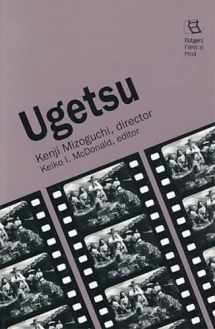
Ugetsu: Kenji Mizoguchi, Director (Rutgers Films in Print)
ISBN-13:
9780813518626
ISBN-10:
0813518628
Author:
Keiko McDonald
Publication date:
1993
Publisher:
Rutgers University Press
Format:
Paperback
186 pages
FREE US shipping
Book details
ISBN-13:
9780813518626
ISBN-10:
0813518628
Author:
Keiko McDonald
Publication date:
1993
Publisher:
Rutgers University Press
Format:
Paperback
186 pages
Summary
Ugetsu: Kenji Mizoguchi, Director (Rutgers Films in Print) (ISBN-13: 9780813518626 and ISBN-10: 0813518628), written by authors
Keiko McDonald, was published by Rutgers University Press in 1993.
With an overall rating of 3.5 stars, it's a notable title among other
books. You can easily purchase or rent Ugetsu: Kenji Mizoguchi, Director (Rutgers Films in Print) (Paperback) from BooksRun,
along with many other new and used
books
and textbooks.
And, if you're looking to sell your copy, our current buyback offer is $0.3.
Description
Ugetsu Monogatari has been widely acclaimed as a masterpiece of the Japanese cinema since the moment in 1952 when its director, Kenji Mizoguchi, won a Silver Lion award for the film at the Venice Festival. Western audiences immediately recognized the pictorial beauty of Ugetsu and the lyrical power of Mizoguchi's camera movements, but most viewers have found the film's narrative elements puzzling and unsettling. Ugetsu seems to move between two radically different worlds: the first is a world at war, conveyed with graphic realism; the second, a highly stylized world of the supernatural, filled with ghosts and apparitions. To understand why Mizoguchi chose to incorporate these disparate experiences in one film and ultimately to integrate them requires an awareness of Mizoguchi's customary themes and of cultural contexts that would be familiar to his Japanese audience.This volume presents a complete continuity script of Ugetsu and an introductory essay by Keiko McDonald, analyzing the complex issues of Japanese culture revealed in the film. Also included are a letter from Mizoguchi to his longtime scriptwriter, the late Yoshikata Yoda; the complete texts of the two Japanese tales on which the film was based; Japanese, European and American reviews and commentaries, some appearing for the first time in English; and a filmography and bibliography.


We would LOVE it if you could help us and other readers by reviewing the book
Book review

Congratulations! We have received your book review.
{user}
{createdAt}
by {truncated_author}


